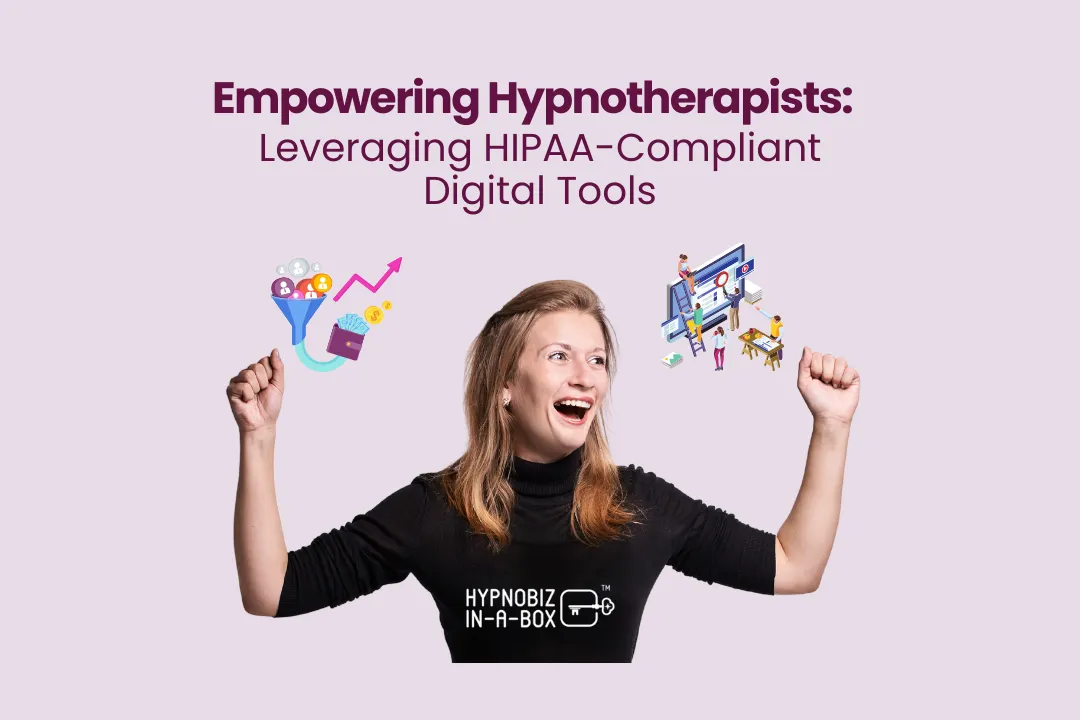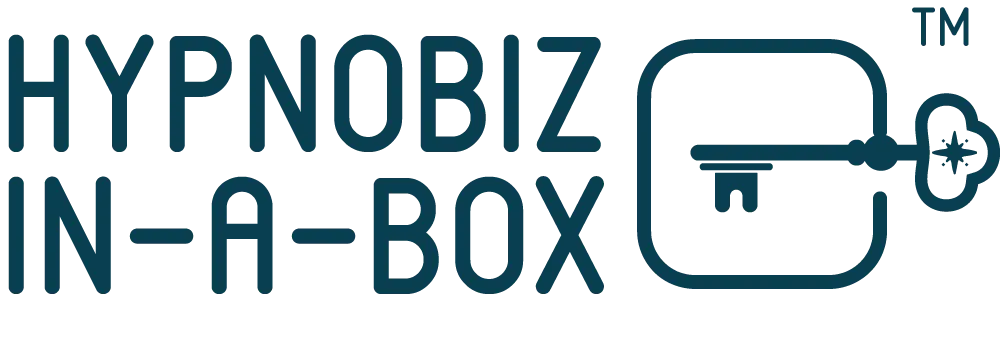HypnoBiz-in-a-Box™ Blog

HIPAA-Compliant Digital Tools for Hypnotherapy Business
Empowering Hypnotherapists: Leveraging HIPAA-Compliant Digital Tools
In today's digital age, hypnotherapists increasingly use technology to streamline their practice and enhance client care. However, with the convenience of digital tools comes the responsibility of safeguarding client privacy and security. This blog post delves into the importance of utilizing HIPAA-compliant digital tools for hypnotherapists, offering insights into how these tools can ensure confidentiality while optimizing practice efficiency.
Understanding HIPAA Compliance
Before exploring digital tools for hypnotherapists, it is essential to understand the significance of HIPAA compliance. The Health Insurance Portability and Accountability Act (HIPAA) sets the standard for protecting sensitive patient data. For hypnotherapists, ensuring HIPAA compliance is paramount to maintaining client confidentiality and trust. HIPAA regulations govern the use, storage, and transmission of protected health information (PHI), requiring strict adherence to security measures and privacy practices.
Transitioning to digital tools can offer numerous benefits for hypnotherapists, including improved organization, enhanced communication, and streamlined administrative tasks. However, selecting tools prioritizing HIPAA compliance is crucial to avoid compromising client privacy and security.
Importance of Digital Tools for Hypnotherapists
Digital tools have revolutionized how hypnotherapists manage their practices, providing efficient solutions for appointment scheduling, client communication, record-keeping, and more. By leveraging technology, hypnotherapists can streamline administrative tasks, reduce paperwork, and focus more time on client care. Additionally, digital tools offer greater flexibility and accessibility, allowing practitioners to provide remote services and reach clients who may not have access to traditional in-person sessions.
Transitioning to digital tools can also enhance the client experience by offering convenient appointment booking, secure messaging platforms, and personalized treatment plans. Moreover, digital tools can improve communication and collaboration among multidisciplinary care teams, ensuring holistic and coordinated care for clients.
HIPAA-Compliant Appointment Scheduling Software
Appointment scheduling software is a valuable digital tool for hypnotherapists seeking to streamline their practice and improve client engagement. HIPAA-compliant scheduling software allows practitioners to manage appointments efficiently while ensuring the security and confidentiality of client information. These platforms typically offer features such as automated reminders, customizable intake forms, and secure messaging, enabling seamless communication between practitioners and clients.
By utilizing HIPAA-compliant appointment scheduling software, hypnotherapists can minimize no-shows, optimize their appointment calendar, and maintain compliance with regulatory requirements. Additionally, these platforms often integrate with electronic health record (EHR) systems, facilitating seamless information sharing and enhancing practice efficiency.
Secure Telehealth Platforms for Remote Sessions
In recent years, telehealth has emerged as a valuable tool for delivering healthcare services remotely, including hypnotherapy sessions. Secure telehealth platforms enable hypnotherapists to conduct virtual sessions with clients while ensuring the privacy and security of sensitive information. HIPAA-compliant telehealth platforms offer encrypted video conferencing, secure messaging, and robust authentication measures to protect client data from unauthorized access or disclosure.
Transitioning to telehealth can offer numerous benefits for hypnotherapists and their clients, including increased accessibility, convenience, and flexibility. Clients can attend sessions from the comfort of their own homes, eliminating the need for travel and reducing barriers to care. Additionally, telehealth allows hypnotherapists to reach clients in remote or underserved areas, expanding their practice's reach and impact.
Secure Messaging Platforms for Confidential Communication
Effective communication is essential in any therapeutic relationship, and secure messaging platforms offer a convenient and confidential way for hypnotherapists to communicate with their clients. HIPAA-compliant messaging platforms encrypt messages end-to-end, ensuring that sensitive information remains private and secure. These platforms often include features such as message threading, file sharing, and message expiration, further enhancing security and usability.
By incorporating secure messaging platforms into their practice, hypnotherapists can facilitate ongoing client communication, provide timely support and guidance, and reinforce therapeutic progress between sessions. Moreover, secure messaging platforms offer a convenient alternative to traditional email communication, reducing the risk of data breaches or unauthorized access to client information.
Electronic Health Record (EHR) Systems for Comprehensive Documentation
Electronic health record (EHR) systems offer hypnotherapists a centralized platform for managing client records, treatment plans, and progress notes. HIPAA-compliant EHR systems provide robust security features, such as access controls, audit logs, and encryption, to protect sensitive client information from unauthorized access or disclosure. These platforms streamline documentation processes, improve record accuracy, and support compliance with regulatory requirements.
By transitioning to EHR systems, hypnotherapists can enhance the efficiency and effectiveness of their practice while ensuring the confidentiality and integrity of client data. EHR systems offer customizable templates, automated workflows, and interoperability with other digital tools, allowing practitioners to focus more time on client care and less on administrative tasks.
Data Backup and Disaster Recovery Solutions
Data backup and disaster recovery solutions are essential components of a robust cybersecurity strategy for hypnotherapists. HIPAA requires practitioners to implement safeguards to protect against data loss or corruption, including regular backups of electronic PHI and contingency plans for mitigating the impact of data breaches or natural disasters. Cloud-based backup solutions offer secure and scalable options for storing client data offsite, ensuring redundancy and resilience in unforeseen circumstances.
By investing in data backup and disaster recovery solutions, hypnotherapists can safeguard against potential client privacy and security threats, such as ransomware attacks, hardware failures, or human error. These solutions provide peace of mind, knowing critical client information is protected and accessible, even in adversity.
Continuous Monitoring and Compliance Management
HIPAA compliance is an ongoing process that requires hypnotherapists to monitor and manage their practice's security posture continuously. Implementing robust monitoring and compliance management tools can help practitioners identify and address potential security vulnerabilities, track access to sensitive information, and demonstrate adherence to regulatory requirements. These tools often include features such as risk assessments, security incident response plans, and compliance reporting capabilities.
By prioritizing continuous monitoring and compliance management, hypnotherapists can proactively identify and mitigate client privacy and security risks, ensuring ongoing compliance with HIPAA regulations. Additionally, these tools support a culture of accountability and transparency within the practice, fostering trust and confidence among clients and stakeholders.
Conclusion: Safeguarding Client Privacy with HIPAA-Compliant Digital Tools
In conclusion, leveraging HIPAA-compliant digital tools is essential for hypnotherapists seeking to enhance practice efficiency while safeguarding client privacy and security. From appointment scheduling software and telehealth platforms to secure messaging and electronic health record systems, these tools offer valuable solutions for managing client care in today's digital landscape. By investing in HIPAA-compliant digital tools and implementing robust security measures, hypnotherapists can ensure that sensitive client information remains protected and confidential, upholding the highest ethical practice and trustworthiness standards.

